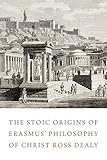The stoic origins of Erasmus' philosophy of Christ / Ross Dealy.
Material type: TextSeries: Erasmus studiesPublisher: Toronto ; Buffalo ; London : University of Toronto Press, [2017]Copyright date: ©2017Description: 1 online resourceContent type:
TextSeries: Erasmus studiesPublisher: Toronto ; Buffalo ; London : University of Toronto Press, [2017]Copyright date: ©2017Description: 1 online resourceContent type: - 9781487511456
- 1487511450
- Erasmus' philosophy of Christ
- 199/.492 23
- B785.E64
- online - EBSCO
| Item type | Current library | Call number | URL | Status | Notes | Barcode | |
|---|---|---|---|---|---|---|---|
 eBook
eBook
|
Biblioteca "Angelicum" Pont. Univ. S.Tommaso d'Aquino Nuvola online | online - EBSCO (Browse shelf(Opens below)) | Online access | Not for loan (Accesso limitato) | Accesso per gli utenti autorizzati / Access for authorized users | (ebsco)1458619 |
Browsing Biblioteca "Angelicum" Pont. Univ. S.Tommaso d'Aquino shelves, Shelving location: Nuvola online Close shelf browser (Hides shelf browser)

|

|

|

|

|

|

|
||
| online - EBSCO The state of missiology today : global innovations in Christian witness / | online - EBSCO The status of women in Jewish tradition / | online - EBSCO The stele of YHWH in Egypt : the prophecies of Isaiah 18-20 concerning Egypt and Kush / | online - EBSCO The stoic origins of Erasmus' philosophy of Christ / | online - EBSCO The Stone-Campbell movement : a global history / | online - EBSCO The storm-god in the ancient Near East / | online - EBSCO The story of God, the story of us : getting lost and found in the Bible / |
Includes bibliographical references and index.
"This study focuses on Erasmus' two-dimensional grasp of Stoicism evident in his edition of De officiis (1501) and the huge implications he saw for religion. The author argues that "The Philosophy of Christ' for which Erasmus is famous is a Christian version of Stoicism."-- Provided by publisher
Online resource; title from PDF title page (EBSCO, viewed February 2, 2017).
Cover; Contents; Preface; Abbreviations; Introduction: A Philosophy beneath the Rhetoric; Part I: The Fifteenth-Century Background: One-Dimensional Stoicism within Either/Or Mindsets; Part II: Erasmus' Two-Dimensional Stoicism; 1 Building Blocks of De taedio Iesu, 1499-1501, and the Enchiridion, 1503; 2 Distinguishing Stoic Meanings: Erasmus' Edition of De officiis, 1501; 3 The Applicability of De officiis; 4 What Had Drawn Erasmus to Stoicism? A Resolution of Bodily and Mental Issues; Part III: Stoic Natural Instinct and Christ's Fear of Death, De taedio Iesu.
1 Oikeiosis, Inborn Character Traits, and True Bravery2 Versus Origen: The Soul Is Neither Flesh Nor Spirit; 3 Unbending Principles, but Not "Alacritas"; Part IV: Larger Philosophical Issues; 1 Objections of Orthodox Stoics: Colet becomes "Colet"; 2 "My Stoics": Terror from Phantasiai or Natural Instinct?; 3 Christ in Gethsemane and the Stoic in the Typhoon; Part V: Correcting a Thousand Years of Christology; 1 Pre-Emotion versus Emotion: From Seneca, Origen, and Jerome to Peter Lombard, Bonaventure, and Aquinas; 2 Emotion versus Pre-Emotion: Correcting Bonaventure.
Part VI: Beyond Devotionalist AssumptionsPart VII: Spiritual Warfare: Christianizing Katorthoma/Kathekon: The Enchiridion militis christiani; 1 Correcting Origen on Indifferentia; 2 Correcting Origen and Socrates on the Origins of Human Diversity; 3 Not Flesh/Spirit but Indifferens/Spirit; 4 A New Type of Warfare: Syncretizing Two Opposite Types of Value; Conclusion; Bibliography; Index.
In English.


